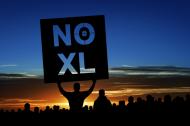 November may still seem a long way off, but increasingly it is looking like the the controversial Keystone XL pipeline is going to become a key Presidential election issue.
November may still seem a long way off, but increasingly it is looking like the the controversial Keystone XL pipeline is going to become a key Presidential election issue.
David Wilkins, who was George Bush’s ambassador to Canada from 2005 to 2009, is one of the many people who think this is the case.
“It’s become a big political issue. Huge. You’ll see a lot more of it as the campaign for president unfolds,” he said earlier this week. It’s not hard to see which side of the political fence Wilkins is on, as his US-based law firm represents the Canadian Association of Petroleum Producers in Washington.
“If President Obama gets re-elected, he may approve the pipeline. If President Obama is not re-elected, the pipeline will absolutely get approved because all of the Republican candidates have indicated they are very much in favour of it,” Wilkins added.
All the leading Republican candidates have become vocal on the issue, pushing what one pundit calls “petro-populism”.
In his “State of the Union response,” a speech given in Tampa under a giant “Obama isn’t working” banner, Mitt Romney called Keystone, “a real ‘shovel-ready’ project that would put 20,000 Americans back to work.”
The only problem with this is that figure, as any regular reader of this blog will know is wildly inaccurate, and Greenpeace recently asked the US authorities to investigate such claims.
But the candidate who is really supercharging the petro-populism garbage is Newt Gingrich, who is now daily whipping up hysteria on the issue.
Speaking in a Florida retirement village this week he told the assembled audience that Obama had “recently vetoed the Keystone pipeline .. to appease left-wing environmental extremists in San Francisco.”
Gingrich added, repeating a script straight out of the oil industry’s mouth, that: “Here was an opportunity to have oil come from Canada through the United States, to the largest petrochemical complex in the world, in Houston. It would have provided jobs for the next 50 years, processing the oil, sending some of it to the ports overseas, so you’d got jobs for the ports, jobs for the refineries, jobs from building the pipeline. He cancelled all that. Right now the Canadians are looking seriously at a partnership with China.”
Gingrich says that approving Keystone would be one of the first executive orders he would sign on the first day of his presidency.
“My message to the people of Canada is don’t cut a deal with the Chinese, help is on the way”.
But after yesterday’s heavy defeat in Florida, Gingrich’s dream of becoming the Republican candidate looks to be in real trouble.

The Keystone pipeline is going to continue to rise in importance until dealt with in a manner that will help to dictate developing a strategy for getting Americans back to work and back on the right track to an economic recovery. It is the lack of a firm decision that is a major blow to businesses, middle class/ blue collar workers and potential other sorts of business that can help support the 20,000 jobs that the pipeline could help to create (http://bit.ly/ytP77z). We need to be a bit more considerate of the Americans for whom this current economic struggle is even more daunting and much harder to recover from. If we are not going to consider this plan then we need to move on with something else so we can begin the real recovery process.